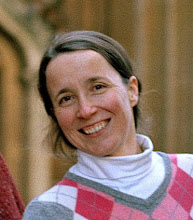 I went to the Foreign Office (FCO) last week for a meeting of the Human Rights Panel. This panel has been revived now after a pause of maybe two years. The topic of our meeting was 'Apostasy' - of renouncing one's faith to embrace another. This can be a great challenge for communities, and of course the individual that takes the step into another religious tradition.
I went to the Foreign Office (FCO) last week for a meeting of the Human Rights Panel. This panel has been revived now after a pause of maybe two years. The topic of our meeting was 'Apostasy' - of renouncing one's faith to embrace another. This can be a great challenge for communities, and of course the individual that takes the step into another religious tradition.What can I say about the meeting? The material that we got was mainly on Islamic teaching on apostasy prepared by a Christian group. It wasn't a particularly happy read, and my Muslim friend, that was the only Muslim at the meeting, did indicate this was a difficult topic within Islam.
Conversion issues were also raised, with reference to a new law that is pushed by Buddhist nationalist monks in the parliament of
This year is the 25th year since the 1981 Declaration on the Elimination of All Forms of Intolerance and of Discrimination Based on Religion or Belief. The FCO wants to highlight it in some way, and hence this meeting for getting ideas for celebrating the Declaration etc. What the FCO ultimately can do is to raise issues with various diplomats they are in contact with.
I raised the point, probably not in particularly eloquent way, referring to the 'secular mind' in the document we received, that we need to approach the matter of apostasy with some humility. The 'secular mind' was created out of necessity, due to the religious wars of the 16th and 17th century. If we look at religious beliefs at the time, many found good reasons for killing his fellow Christians if they didn't belong to the same church.
And the 'secular mind' is not a neutral mindset which allows for various beliefs and attitudes to exist within a culture. It's a definite belief in human progress through science and economic development, and which demands that religious values are kept in the private sphere. If the FCO thinks that it is neutral and should be seen as such, I would suggest that the FCO is misleading itself. It has an agenda and a worldview, which in international relations is threatening another agenda and worldview. So some humility, or at least modesty, would be beneficial.
I also had a positive suggestion. I think what would help clarify various issues in international relations if we could have a dialogue on various principles, like freedom and equality. The FCO rep retorted that such matters are not for the FCO to do, they can't get into theological debates… [hmmmm…]
But if what they want to do is to spread democracy and human rights in the world, and such ideas are not welcomed because they come loaded with various other things, we should discuss the basic principles of democracy and human rights- freedom and equality. This has nothing to do with theology.
I think that would be a very useful and enlightening dialogue. But maybe that will be too great a challenge for our leaders?
Someone else brought up the point of human dignity, and yes, why not speak about human dignity? What is human dignity and how do we express it? That would be very interesting and reveling. I personally think western politics (or all politics) lack this kind of basic philosophical inquiry. It would be refreshing, wouldn’t it?
I don't think it is beyond us, it's just that we've seemed to have forgotten all about it.
Or am I just too idealistic, or strange? Or both?

No comments:
Post a Comment